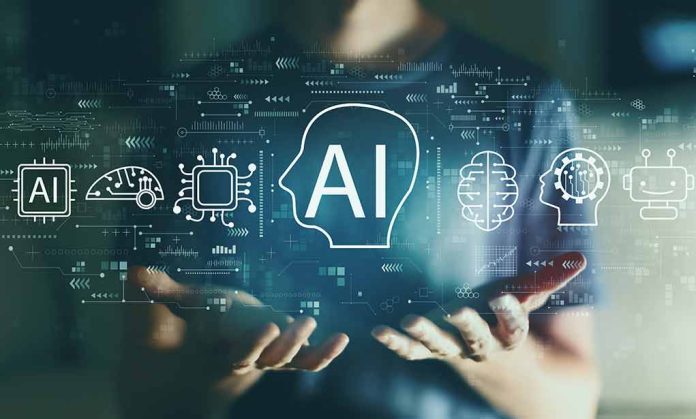
Americans face a stark future where nearly half of Gen Z believes retirement will be impossible, AI will replace human doctors, and average home prices will soar beyond $680,000 by 2065.
Key Takeaways
- 48% of Gen Z believes retirement won’t be an option for most Americans by 2065, with 64% agreeing younger generations will have worse retirement experiences than baby boomers.
- The average home price is projected to reach $682,120 by 2065, requiring an estimated household income of $508,950 to maintain current living standards.
- 39% of Americans foresee a society run entirely on digital currency, while 36% predict biometric payment methods will become standard.
- 32% anticipate having robot roommates or caregivers, and 35% expect households to be managed by smart home AI technology.
- 51% predict digital alternatives for retirement care will emerge due to affordability challenges, with traditional retirement requiring an estimated $3.54 million in savings.
The Housing Crisis of 2065: Ownership Becomes a Luxury
The American dream of homeownership appears to be slipping further away with each passing decade. According to a comprehensive survey of 2,000 Americans conducted by Talker Research for LevLane, the average home price is expected to reach a staggering $682,120 by 2065. This projection represents a massive increase that outpaces current wage growth trends, creating a housing market where many Americans will be permanently priced out. Currently, only 41% of survey respondents own homes, and among non-owners, just 35% believe they will ever achieve homeownership, while 25% have resigned themselves to renting for life.
The economic implications extend beyond housing, with respondents estimating that an average household income of $508,950 will be necessary by 2065 to maintain current living standards. This represents a more than five-fold increase from today’s median household income, raising serious questions about wage growth and economic inequality. For many Americans, particularly younger generations, these projections paint a troubling picture of a future where basic economic stability becomes increasingly unattainable despite technological advancements.
AI Healthcare Revolution: Robot Doctors and Implanted Monitors
Healthcare is poised for dramatic transformation by 2065, with artificial intelligence taking center stage in medical diagnosis and treatment. The survey reveals that many Americans anticipate consulting AI doctors regularly, a shift that could fundamentally alter the patient-provider relationship. This technological revolution extends beyond the doctor’s office, with 30% of respondents foreseeing a future where they live with implanted health monitors continuously tracking vital signs and medical conditions.
The integration of AI into healthcare presents both opportunities and challenges. While these technologies may increase access to medical expertise and reduce certain costs, they also raise concerns about data privacy, the quality of care, and the potential loss of the human element in medicine. For conservative Americans who value personal relationships with healthcare providers and are wary of technological overreach, this shift may represent yet another area where traditional values and practices are being eroded by unchecked technological advancement.
The End of Retirement as We Know It
Perhaps the most alarming finding from the survey is that nearly half of Gen Z (48%) believes retirement simply won’t be an option for most Americans in 40 years. This pessimistic outlook is shared across generations, with 64% of all respondents agreeing that younger generations will have a worse retirement experience than baby boomers. The financial barriers are daunting, with estimates suggesting retirement will require approximately $3.54 million in savings, a figure well beyond what most Americans can realistically accumulate.
“This research offers a striking look at how Americans, especially younger generations, are reimagining the future,” said Kelly Sizemore, chief growth officer at LevLane. From housing and health care to income and retirement, people are clearly preparing for a world where traditional milestones are being reshaped by technology, cost pressures and cultural shifts. But, these insights don’t just highlight anxieties, they also reveal how people expect innovation to rise and meet evolving needs. It’s a call to brands, institutions and policymakers to listen, adapt and lead with empathy and foresight.
In response to these challenges, 51% of Americans anticipate the emergence of digital alternatives for retirement care due to affordability issues. Gen Z’s retirement preferences already show a marked departure from previous generations, with 29% wanting to retire with family, 20% planning to travel, and 17% desiring hobby farms. Additionally, 16% of Gen Z express interest in living off the grid, while 15% prefer co-living communities with friends, suggesting a fundamental reimagining of the retirement concept.
Digital Currency and Smart Homes Define Daily Life
The financial landscape of 2065 appears drastically different from today’s system, with 39% of Americans predicting a society run entirely on digital currency. Another 36% anticipate biometric payment methods becoming the norm, suggesting physical wallets and traditional banking may become relics of the past. These changes align with President Trump’s embrace of cryptocurrency, but raise serious questions about privacy, government oversight, and the stability of a fully digital financial system.
“The picture painted here isn’t just about economic uncertainty, it’s about a shift in values,” said Chris Moreira, chief creative officer at LevLane. Younger generations are signaling that the future they imagine isn’t rooted in excess, but in connection, flexibility and purpose. Whether it’s redefining retirement, rethinking ownership or embracing new technologies, the challenge and opportunity lies in designing a future that reflects these evolving priorities.
Within the home, technological integration will reach unprecedented levels, with 35% of respondents expecting households to be run by smart home AI technology. Even more remarkably, 32% anticipate having robot roommates, housekeepers, or caregivers. The traditional workweek is expected to shrink to approximately 30 hours or four days, potentially allowing for better work-life balance but also raising questions about income stability. These projections paint a picture of a future where Americans’ daily lives, finances, and homes are defined by technological integration in ways that would be unrecognizable to previous generations.














